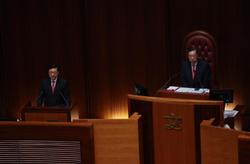 Hong Kong Chief Executive John Lee Ka-chiu (left) delivers his maiden Policy Address at the Legislative Council on Oct 19, 2022. (ANDY CHONG / CHINA DAILY)
Hong Kong Chief Executive John Lee Ka-chiu (left) delivers his maiden Policy Address at the Legislative Council on Oct 19, 2022. (ANDY CHONG / CHINA DAILY)
Hong Kong will further deepen partnership with other cities in the Guangdong-Hong Kong-Macao Greater Bay Area in various aspects to create fresh growth impetus for its economy, Chief Executive John Lee Ka-chiu said on Wednesday.
“The Greater Bay Area’s development has enhanced inter-connectivity and integrated development among the city cluster,” Lee said in his maiden Policy Address.
![]()
“The government will make good use of the strengthened Guangdong‐Hong Kong and Hong Kong‐Shenzhen cooperation mechanisms and utilize the relevant task forces as platforms to deepen collaboration with other GBA cities.”
Describing the Northern Metropolis as the “foothold” for Hong Kong’s strategic development and the “new engine” for the special administrative region to scale new heights, Lee said his administration will work closely with the Guangdong provincial government to enable the mega project to play a bigger role and help create synergy in the region.
Describing the Northern Metropolis as the “foothold” for Hong Kong’s strategic development and the “new engine” for the special administrative region to scale new heights, Lee said his administration will work closely with the Guangdong provincial government to enable the mega project to play a bigger role and help create synergy in the region
To achieve that, the HKSAR government will set up a department dedicated to the area’s development next year to steer and coordinate with various departments in pressing ahead with the development in an innovative way, he said.
ALSO READ: CE focuses on talent, housing, reform in maiden address
The cross-boundary transport network will be further improved to pave the way for regional integration. The Hong Kong-Shenzhen Western Rail link connecting Hung Shui Kiu with Shenzhen’s Qianhai will be built to promote connectivity between the two cities, Lee said.
The first phase of the project’s feasibility study will be completed this year, according to the Transport and Logistics Bureau, and the SAR government will carry out the second phase with the Shenzhen authorities in the first quarter of 2023.
To help Hong Kong enterprises and its people better grasp the opportunities brought by the GBA’s development, Lee said the Hong Kong Economic and Trade Office in Guangdong will set up a dedicated promotion center. The number of “GoGBA Business Support Centers” established by the Hong Kong Trade Development Council will be increased to cover all the nine Guangdong cities in the region. The center will organize business missions, training and other events in various mainland provinces and municipalities.
With the aim of attracting more talent to Hong Kong, Lee said the city will expand the scope of the Immigration Arrangements for Non-local Graduates to cover those who have graduated from the GBA campus of a Hong Kong university. The pilot program will run for two years. Previously, only non-local graduates from a Hong Kong university are qualified for the arrangement.
ALSO READ: CE's Policy Address gives 'clear direction, vigorous action plan'
In medical care, Lee said the government will have discussions with the mainland authorities about allowing more Hong Kong‐registered drugs and medical devices to be used in mainland cities in the GBA.
“In addition, we will study the feasibility of allowing Hong Kong people living in the mainland cities of the GBA to make use of the Elderly Health Care Vouchers for settling payments of mainland medical insurance premiums,” he said.
The chief executive also pledged to further enhance interaction between Hong Kong and other GBA cities in legal affairs. The Department of Justice will set up a task force focusing on strengthening mutual legal assistance and facilitating the convergence of legal practices between the two sides. An online mediation platform dedicated to providing dispute resolution services in the GBA will be established next year.
Chang Yuk-kam, president of The Hong Kong Institute of Housing, welcomed the SAR government’s plans to develop the GBA and the Northern Metropolis.
READ MORE: CE urges HK to strive for new development under Xi's guidance
Although the Chinese mainland currently has no professional qualification certificates in property management, she urged the SAR government to strengthen communication with the mainland so that mutual recognition of such a qualification could be granted once the mainland gives the green light.
Fung Kwok-keung, president of the Hong Kong Institute of Construction Managers, hopes that through cross-boundary collaboration, Hong Kong and other GBA cities could complement each other in human resources and leverage their respective strengths to promote the industry’s development.
While welcoming the government’s move to offer more support and incentives to attract talent from the mainland and overseas as it could provide a stable labor force for the construction sector in Hong Kong and the GBA, Fung cautioned that a delicate balance in work opportunities needs to be struck between local people and those from elsewhere.


